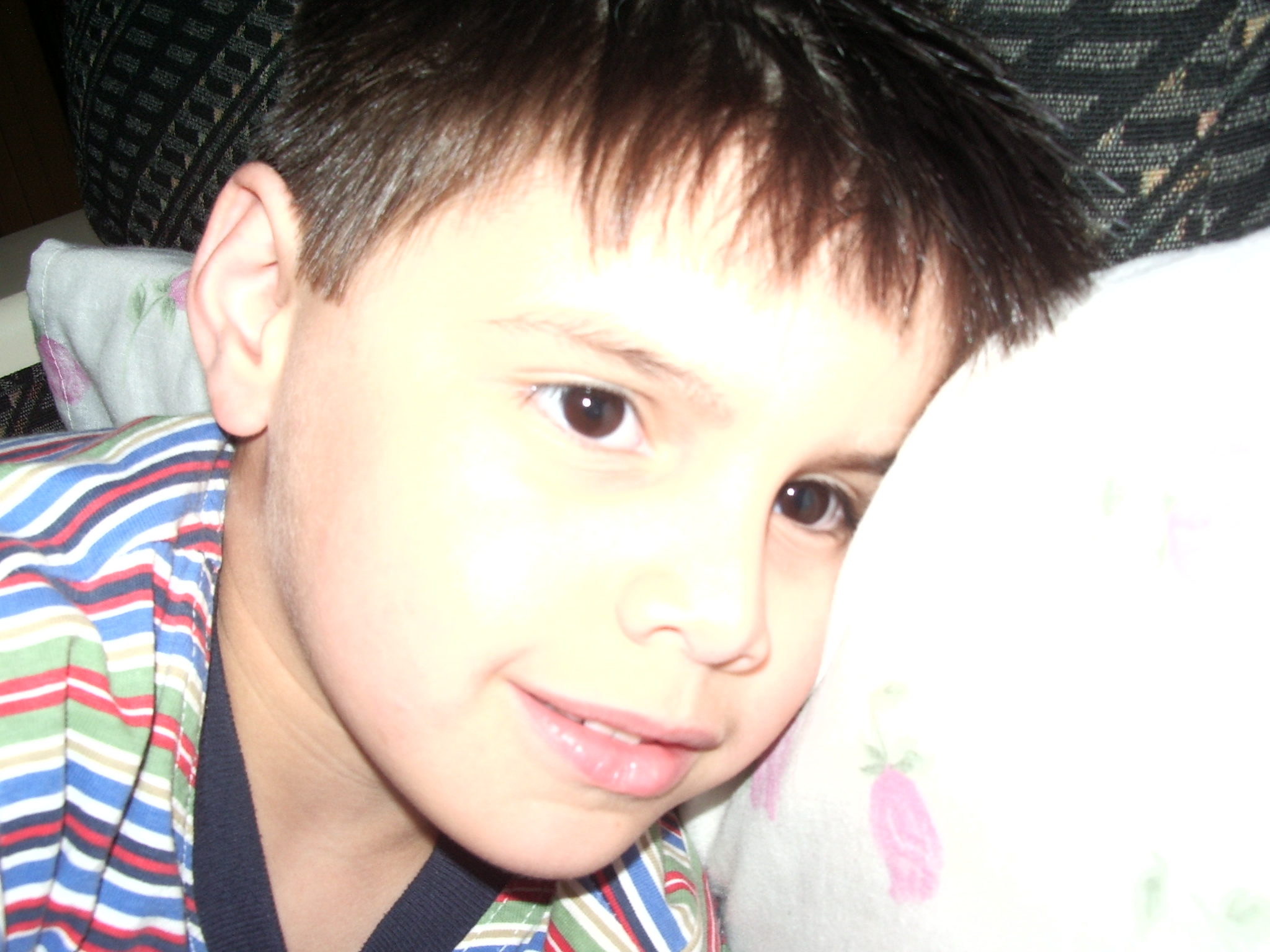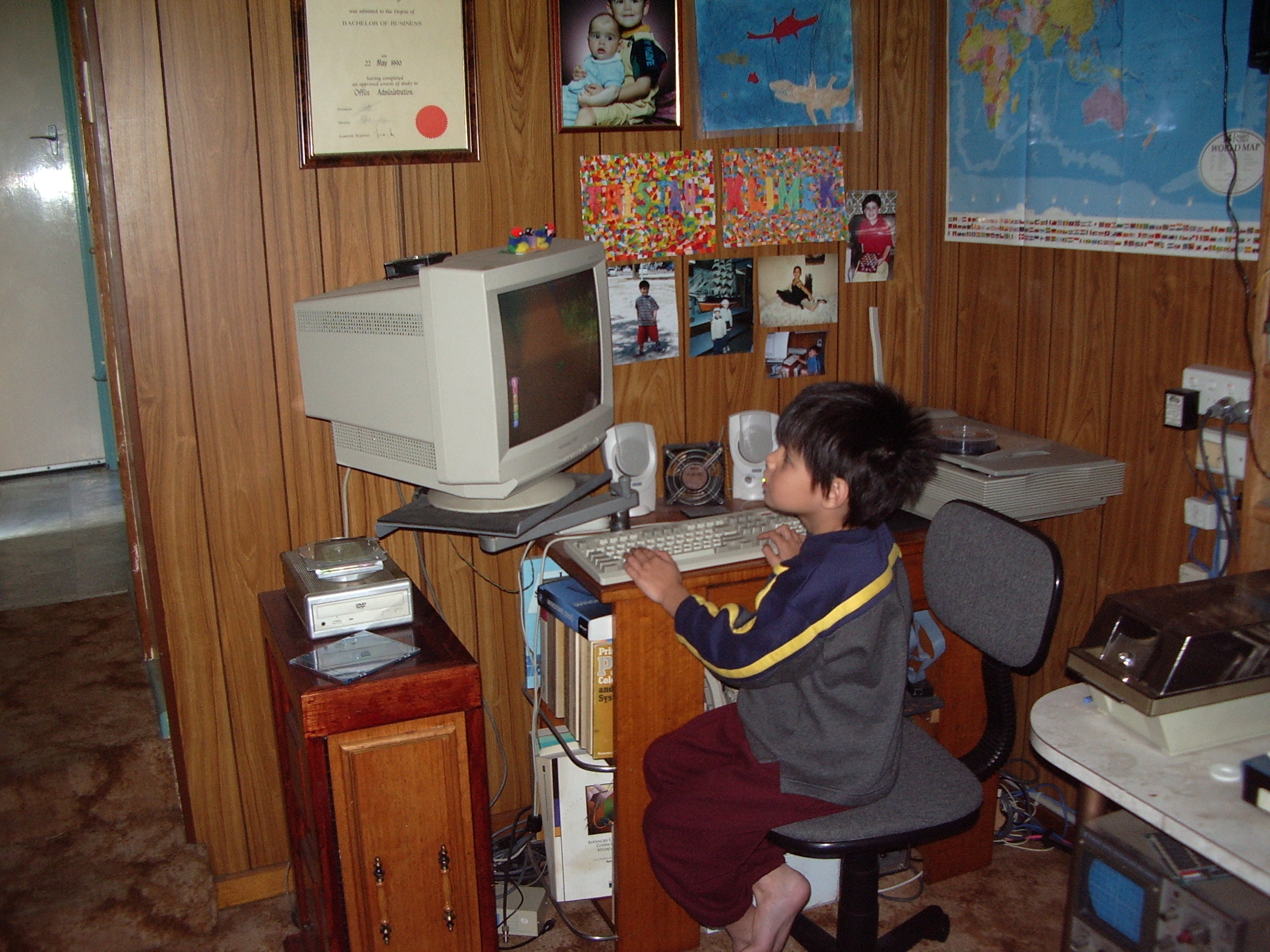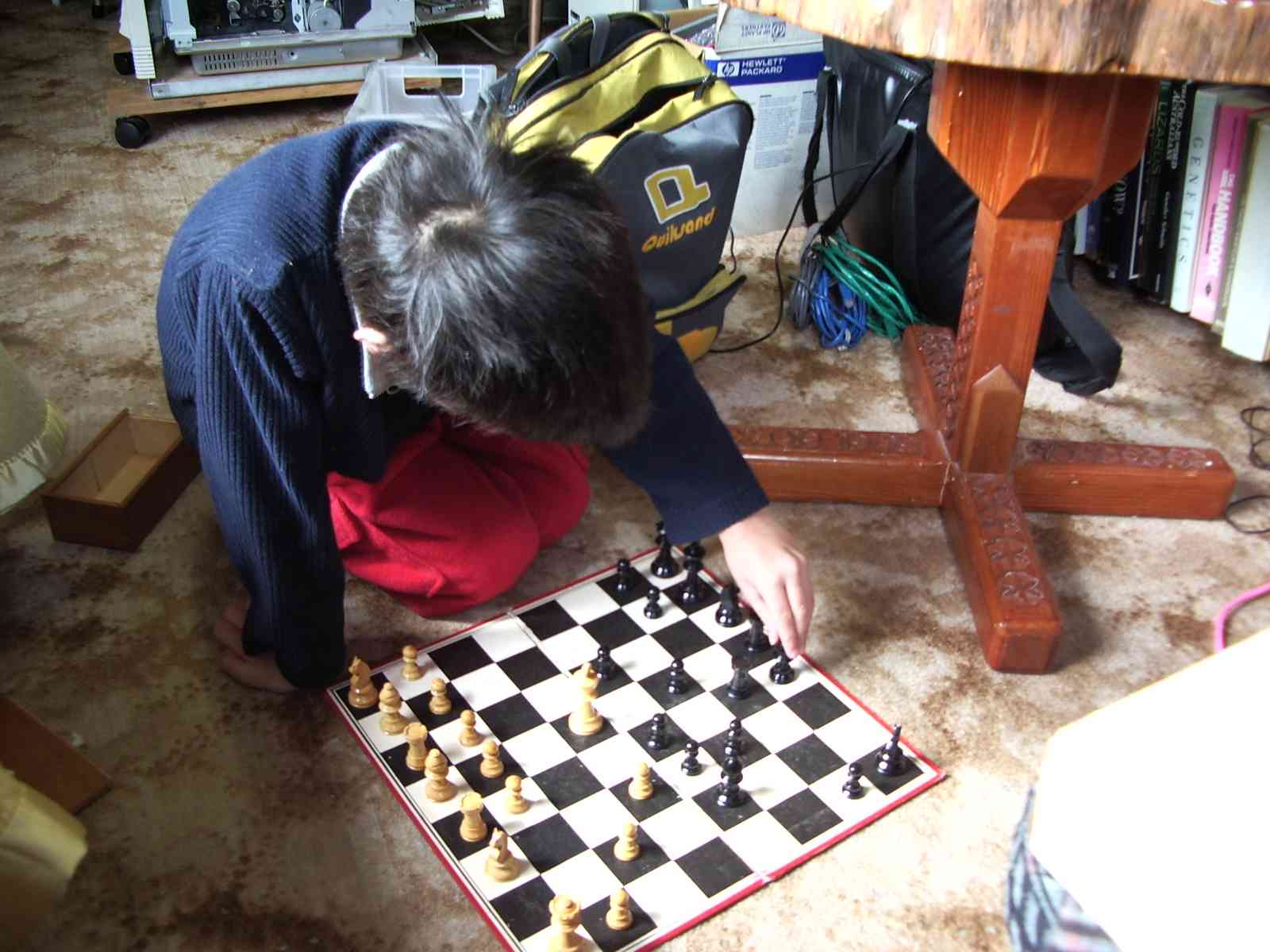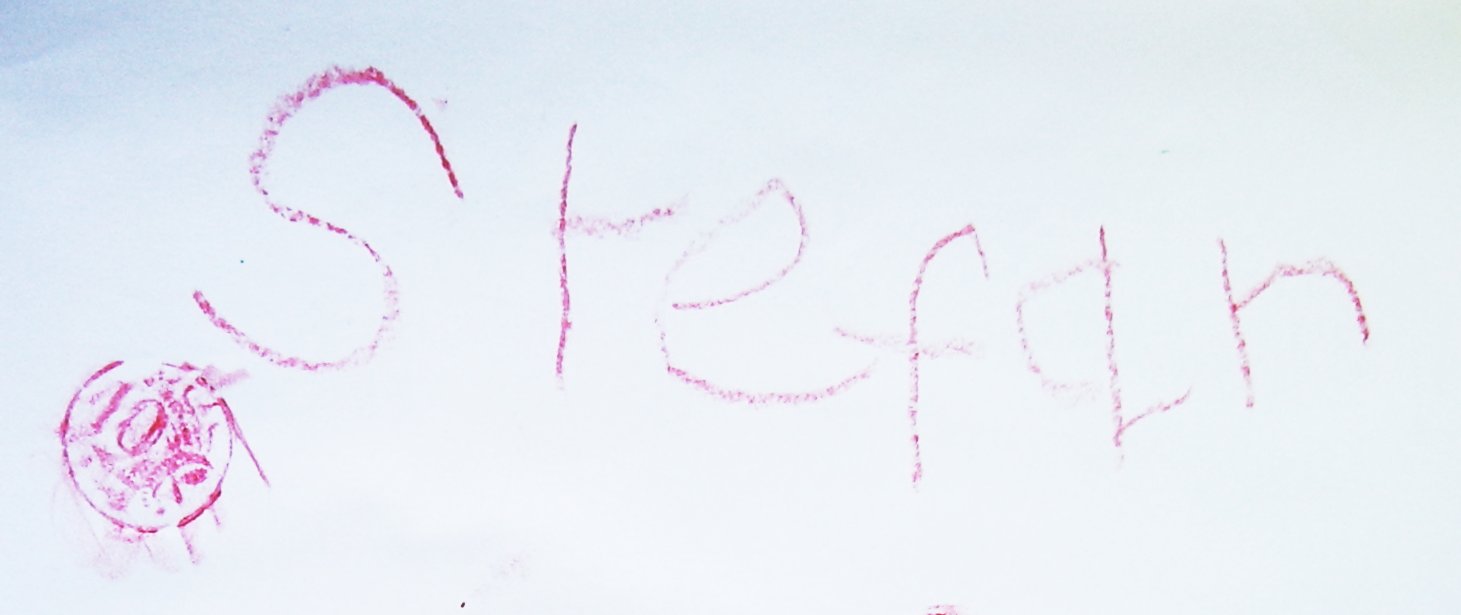Autism, a personal story and case history.
By ralph klimek, June 2007
copyleft,
this article may be reused, quoted whole or in part, for any bona-fide
educational, medical research or journalistic purpose
Much has been written about this medical condition known as Autism Spectrum Disorder. I will not attempt to reproduce any of it here, there is more than enough already. It is a condition with a spectrum of disability from allmost vegetative to highly functional individuals with socialization difficulties. This case history that I present here concerns my third child. My target audience is any parent who finds themselves with a pediatricians' diagnosis of Autism Spectrum Disorder who may be interested in reading other parents' experiences and observations.
I regret that I cannot offer much comfort. There are a myriad of reasons that can cause the brain to be deficient in neural pathways or missing or stunted organelles that result in the global "ASD" condition. Sometimes there are genetic or abnormal chromosomal indicators that result in metabolic pathways being broken, but these conditions are also associated with other severe medical problems as well. The condition manifests itself in many differant ways, ASD is not a specific illness as you would consider rabies, the plague or say, trauma. If there are no chromosomal indicators then there is no specific cause. It wasnt anything you ate or failed to eat in the first trimester, mobile phone radiation or even MMR vaccine , one of the many emotional crutches that angry parents who feel the overwhelming need to "blame" something will cling to.
Are there familial indicators of mental problems? Yes there are, and without going into detail to sheild the good name of the living there is dyslexia, chronic depression , OCD and on the positive side there is extraordinary precociousness and mostly just plain old normality.
There is no cure.
There is treatment and management and love.
My third child, a beautiful boy, was born normally in good condition. Gained weight as a healthy child should, met the early milestones, was on his feet and toddling around the house at 12 months. He was as apprently mentally normal for one year of age. His elder brother had already and precociously started speaking at one year and we were eagerly awaiting what the new arrival would have to say. By eighteen months he was making the normal toddlers attempts at speech. At two years, there was still no real advancement in speech. We still did not panic at this point because he was still behaving as a normal two years does. He was then and still is very independent. As soon as he could walk he would help himself to food that was within in his reach and he would explore the kitchen cupboards looking for food opening containers if required. At two years, if he felt tired, he would lay himself down in a quiet corner after seeking and grabbing his favorite pillow. Sometimes I would find him outside on the grass snoozing on his favorite pillow, he would sleep when and where it pleased him to do so. Normal karyotype, no metabolic considerations.
He was never a "difficult" child, easily pacified, and when he was inconsolable for some reason he went to his elder sister for comfort. They have a special bond, often his sister could comfort him when we, his parents, could do nothing.
So he progressed to three years of age. We were becoming just a bit concerned now. He was missing some developmental milestones. In particular his early beginnings with speech had completely vanished. He was completely without any directed voluntary speech and spoken language to him had no meaning. Physically he had developed completely normally,was agile, exhibited intelligence in the sense that he could navigate his surroundings, open locks, containers and would look after his little toys. He was extremely orderly and would , even at three, tidy beds and straighten crooked tea towels. He would be offended if his things were out of place. He did not play normally, the play was very simplistic and appeared to consist of endless rituals of arrangeing objects in very fixed patterns. If I emptied his toy box and invited him to play, his idea of playing was to return every item to the box in precisely the order and position it had occupied.
Socially, he accepted the effection of those around him and was distressed when he was ostracised by his siblings. He reacted very badly if we were displeased with him and had to learn how to chastise or correct him in a very mild way. We were extremely fortuneate that he did not exhibit any so called challeging behaviours and we could go out in public without incident or embarrassement.
When he turned three we were referred to a pediatrician with our concerns. At this point in his life there was no functional voluntary speach or verbal understanding. He made a handfull of sounds from which we learned to infer his needs. If he wanted something he would point, not with his hands, but would take our hand and point with that, sometimes guiding our hand to the object he wanted or guiding us in the action that he wanted us to perform. His reaction to things not going his way was to hurl himself on to the floor, this is a characteristic behaviour which will gradually stop as he acquires basic life skills. He had a deep memory. He never forgot where his favorite objects were. He had parrot speech, the pediatricians call it echolalia. He had a very deep memory. He had the very autistic ability to watch a movie and then quietly sit in his favorite corner and repeat maybe an hours worth of the movie soundtrack complete with orchestral and sound effects. Even the actors' accents could be distinguished. But there was clearly no understanding or intelligence in what he was saying or rather reproducing. It was one of his most charming behaviours, and he learned that it could earn him a reward. At this stage we had no success with toilet training. Loud noises would distress him, he was particularly afraid of motorised tools and appliances.
After the second consultation with the pediatrician which also involved prolonged observation he was immediately placed in a Special Development School. We were extremely fortuneate because at this instant there was no waiting list. The medical rationale for this very early interventation is this. The young brain is very "plastic". There is a huge amount of neural growth and growth in neural complexity. This is the age when the most fundamental of mental skills are developed and the simple medical consensus is that by age seven, these most fundamental skills must be inplace or they are never properly acquired. The management and intervention philosophy of the SD Schools is attempting to salvage whatever skills and mental develpmental potential they can. It makes perfect sense. The school program is very intensive and I think they do a wonderfull job. They dont mess about and do what is required, always in the most gentle and humane way.
By the age of four, this child was still showing no signs of functional speech. His play pattern was still abnormal. He was extremely echolalic and exhibited astonishing feats of deep auditory memory. He favorite movie was "The Sound of Music", he had memorised not only all the twelve or so songs but nearly all the dialogue as well. We were treated by him to endless replays of baron von trapp and his rich fiance in the most serious dialogue about love and social standing, the dramatic pauses and accents and emphasis were worthy of someone who had been attending acting academy for several years. But sadly, it was nothing but an echo, a recording, it was something he could do and sometimes get a sweet for. The songs were pitch perfect, and sometimes repeated incessantly. We tried to interest him with the piano and invite him to play with it, but sadly has never shown any interest in it. He exhibits more deep memory, this time of space. His mother forgets where in the huge mall carpark she had left her car, but this child will lead her to it without fail. He is extremely distressed by certain harmless objects and sounds. He cannot abide the sound of my power tools and is terrified of the vacuum cleaner. Yet he helps me push my petrol driven lawn mower. By now we had an official medical diagnosis of Austism Spectrum Disorder and rated moderate to severe on their scale.
At five years of age, and very suddenly, he takes to the toilet and manages the whole business for himself. He is very fastidious and takes great pride in his ability to toilet himself. This could be a response to his little classmates, many or whom are more severely disabled and will never be able to handle this critical skill themselves. Can you imagine our relief ? After three children over a span of ten years I had been up to my elbows in nappies. We were free, in a very palpable sense. By now, there are maybe a dozen real words he uses to indicate his needs. Once or twice he melts my heart with a clearly enunciated "Hi Dad!" when I arrive home after work. Cannot use or construct sentences but very suprisingly will borrow pieces of dialogue from a movie he had memorised in a similar context. So for example when he wanted my immediate attention he would declaim , in a beautiful Scottish brogue " Harry Potter....(pause)...come here !! " (Professor McGonnagle). At this age he shows considerable interest in computer games, watching me or his older brother. He learns to drive the games very rapidly, provided that there is no verbal or reading cues required he will complete an entire game of something like Rayman or Harry Potter or Shrek. This includes plugging in the power, throwing circuit breakers, inserting the correct CD. logging on with password and clicking icons on differant computers ( we are a family of nerds ) each with differant procedures. To see it is to believe it. We take him skating and he becomes confident on skates after three sessions.
Now at six or seven years we begin slowly to understand the nature of his affliction. ASD deletes particular mental abilities and leaves others unaffected or even enhanced. In the medical literature, there are descriptions of autopsied autistic brains. The common feature is that particular brain organelles are either missing or degenerate , or neural bundles , missing or attrophied. It is not global in scope but affects some particular piece of brain anatomy. My personal observation of my little boy now that he is nine, his voluntary meaningfull speech is beginning to emerge, but, it is similar in some ways to the broken speech of stroke victims that I have known. Sometimes he appears and plays and acts allmost normally, and we think, hope...perhaps he will "snap out of it". We are , off course, always frustrated in that hope, the glimmer of "normality" was just that, a mere hint of the boy he might have been. We go to the Australian gold coast for a holiday to Sea World. There is a merry-go-round, a beautifull and harmless ride. He is terrified and throws a tantrum. The ride is stopped and he is removed. He quickly regains his composure and watches his siblings enjoying "the tower of terror" , A high ride up a columnb, on which you haul yourself up on a servo assisted rope and then drop rapidly. He watches his siblings with big longing eyes. "No way" , we say, not after the merry-go-round incident. I then have an inspiration and then a terrible public fight with his mother. I would go up with him. I won this minor battle of wills (probably the only time) and we spent nearly the next hour going up and down at his insistence. This is ASD, a harmless merry-go-round throws him into a hysterical panic but a plunge down 30 meters merely thrills him. After that he prooves his mettle by riding roller coasters with me.
Go figure!
Now I talk about years six, seven and eight. Time moves on, the days months and years begin to blur and merge into a grey continuum. He is progressing well at Special School. Sadly he is assessed with a very low, sub normal IQ. In a way, just as well, because you "flunk" special school by scoring too high! (and out you go, to normal school) He enjoys his school, he never displays anxiety about school and he happily puts himself on to the school bus in the morning. He can answere with yes or no simple questions about his day or his needs or even questions such as " is this object green" . He learns to write his name, letters and numbers and is always willing to show off his skill. At eight years he shows us unambiguous evidence that he "gets" the purpose reading. The story is worth repeating. It comes up to his eighth birthday. At the school they always make a little fuss and class party for the birthday occasion. His mother packs lolly bags to be shared with his classmates and puts the name labels on them. He walks into the kitchen, notices the 10 or so lolly bags. He is attracted to sets of similar objects as playthings, takes the lolly bags and adjourns to his favorite corner. He then begins to arrange the bags. His mother confiscates the bags, he grabs them back and arranges them again. I watch, but do not intervene. Then we notice that the bags , which are identical with the exeption of the name tags, are arranged in the identical way. One bag is removed by him and placed in an adjacent room. We ask , "why is Zoes bag in the other room". He replies in his broken speech " Zoe not in class" . It was true, "Zoe" is not in his class, the arrangement of the lolly bags was the seating order in his classroom. We were beside ourselves with joy, we not only got a meaningfull answere to a spoken question but there was real evidence of a rudimentry reading ability. We test it, and he correctly reads out the name tags. We quietly rejoice.
Now he is nine. His verbal agility is slowly growing in strength. He can answere yes no questions and questions that can be answered with one word. He is still very fastidious, he makes his own food, instant noodles and sandwiches. He is extremely neat. As his verbal skill grows, the amazing echolalia diminishes, and sadly, he will no longer sing. Apparently thats meant to happen. He loves his computer games. When his brother lets him play Grand Theft Auto, he takes particular care to obey road rules. He actually stops at red lights and for pedestrians, otherwise he enjoys picking fights with the police! (please note, this is not the example we are trying to set here , GTA3 is certainly not an educational software!) We still cannot interest him with the piano. He begins to play constructively with Lego. He knows and uses maybe one hundred words and can read some simple words on demand. He demands that I take him for a daily walk, we are blessed with good parks and bike tracks and he will walk for ten kilometers without complaining. I am debating with myself if I should teach him the use of the bicycle. He is physically capable and has the balance and coordination but I am concerned about his sense of traffic and sense of danger. Its about control, I feel that I cannot be in sufficient control of him on a bicycle. He is no longer terrified of the vacuum cleaner and will now take it for a spin to show off how brave he is.
He shows us more often that he gets the idea of reading. He takes his collection of Disney books and reads to us the titles. He likes to copy words on to his magna doodle and when he wants to show off his skill he will write the names of his classmates. I think his class teacher gets him to assist the slower kids to write their names.
There is one neural function indicator that is interesting. He lacks a normal tickle response. If you tickle the soles of his feet there is allmost no reaction. He does derive considerable pleasure, however, and when younger, would indicate to us that he would like his feet tickled, and now that he has some power of speech will sit by me and ask me to "tickle foot" . One may not tickle other parts of his body, he interprets this as aggression and is distressed.
These days he will invite me to sit beside him to watch his favorite movie with him. Now he gives me a running commentary on the movie with one or two word comments. He can drive the half dozen assorted remote controls with competence, he was not taught this, he acquires these skills by watching other people and trying things out. He will ask for help as required.
Now he is about to turn eleven. His power of speech grows fitfally from year to year. It is still not possible to converse or give advice , explanations or direction. Remarkably, and thanks to the amazing staff at Special School he can read and get meaning from what he reads. He can write ! He finds it easier to write his requests on his magna-doodle (than to ask verbally), proudly show us the written request and await approval. We allways approve, how could we not ? It is too good to be true. One of the requests is for permission to watch his favourite movie, again. It is the Titanic. He has memorised the dialog, all of it. You would too if you had seen it 100 times!
Well, where too from here ? It is unlikely that he will speak as we do, but maybe just enough to get through life. He has good to excellent memory, spatial and visual intelligence. He can do "anything" provided it can be demonstrated. He is lost if something requires a verbal explanation. He is capable of independent action, is physically competent, is aware of his surroundings and the feelings of those around him. He chooses his friends, is sensitive to slights and reproaches. I am not confident that he can have an truly independent life and am resigned to always have a dependent child as long as I yet live. We have been blessed with an happy, orderly and placid child and I can honestly say, is not a burden.
There are too many other parents at his special school whose life has become a nightmare , and so, I will not describe my lot as a burden.
Who knows what time may bring.

At six years old

playing a Harry Potter game at the PC

Playing playing chess with himself

homepage
